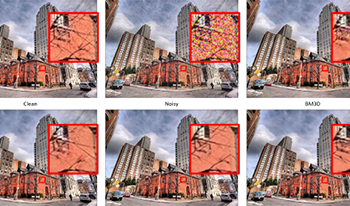
Image denoising is a crucial task in image processing, aiming to enhance image quality by effectively eliminating noise while preserving essential structural and textural details. In this paper, we introduce a novel denoising algorithm that integrates residual Swin transformer blocks (RSTB) with the concept of the classical non-local means (NLM) filtering. The proposed solution is aimed at striking a balance between performance and computation complexity and is structured into three main components: (1) Feature extraction utilizing a multi-scale approach to capture diverse image features using RSTB, (2) Multi-scale feature matching inspired by NLM that computes pixel similarity through learned embeddings enabling accurate noise reduction even in high-noise scenarios, and (3) Residual detail enhancement using the swin transformer block that recovers high-frequency details lost during denoising. Our extensive experiments demonstrate that the proposed model with 743k parameters achieves the best or competitive performance amongst the state-of-the-art models with comparable number of parameters. This makes the proposed solution a preferred option for applications prioritizing detail preservation with limited compute resources. Furthermore, the proposed solution is flexible enough to adapt to other image restoration problems like deblurring and super-resolution.

The non-stationary nature of image characteristics calls for adaptive processing, based on the local image content. We propose a simple and flexible method to learn local tuning of parameters in adaptive image processing: we extract simple local features from an image and learn the relation between these features and the optimal filtering parameters. Learning is performed by optimizing a user defined cost function (any image quality metric) on a training set. We apply our method to three classical problems (denoising, demosaicing and deblurring) and we show the effectiveness of the learned parameter modulation strategies. We also show that these strategies are consistent with theoretical results from the literature.